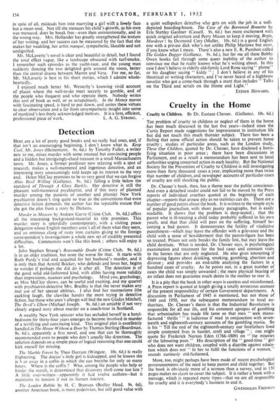Cruelty in the Home
Cruelty to Children. By Dr. Eustace Chesser. (Gollancz. 10s. 6d.)
THE problem of cruelty to children or neglect of them in the home .has been much discussed in the last five years—indeed since the Curtis Report made suggestions for improvement in institution life but did not touch this much thornier subject. There has been a feeling that some official action should be taken to prevent home cruelty ; studies of particular areas, such as the London study, These Our Children, quoted by Dr. Chesser, have disclosed a horri- fying situation in poor areas ; there have been discussions in Parliament, and as a result a memorandum has been sent to local authorities urging concerted action in each locality. But the National Society for the Prevention of Cruelty to Children is still investigating more than forty thousand cases a year, implicating more than twice that number of children, and newspaper accounts of particular cases of cruelty are still shocking the public.
Dr. Chesser's book, then, has a theme near the public conscience. And even a detached reader could not fail to be moved by the Press reports of individual cruelties quoted at the beginning of each chapter—reports that arouse pity as no statistics can do. There are a number of good points about the book. It is written in the simple style of popular journalism, with short jaunty paragraphs, but is easily readable. It shows that the problem is deep-seated ; that the parent who is ill-treating a child today probably' suffered in his own youth, and that that child will pass on the suffering, himself be- coming a bad parent. It demonstrates the futility of vindictive punishment—which may leave the offender with a grievance and the child with a sense of bewilderment that the parent-figure has been so treated. Prison not only breaks the family link, but may leave the child destitute. What is needed, Dr. Chesser says, is psychological examination and treatment for the bad cases and constant visits to the homes that are only neglected. He also gives interesting if depressing figures about drinking, smoking, gambling, abortion and divorce; and provides an end-table analysing the factors in a hundred cases of cruelty. As he points out, in a great number of cases the child was simply unwanted ; the mere physical bearing of an infant does not guarantee much desire in the mother to rear it.
It is a pity that the book in other ways is careless and misinformed. A Press report is quoted at length giving a totally erroneous account of the present responsibility of certain Government departments. A discussion in Parliament of 1945 is mentioned, but not those of 1949 and 1950, nor the subsequent memorandum to local au- thorities. Dr. Chesser's thesis is that the Industrial Revolution is responsible for all our ills, and his comment apropos of gambling that urbanisation has made life tame so that men " seek manu- factured thrills ' " is ludicrous if read in conjunction with seven- teenth and eighteenth-century accounts of the gambling mania. So is his " Till the end of the eighteenth-century our forefathers lived simple contented lives in hamlet, croft and village " ; one might quote Sir Frederick Norton Eden (1766-1809) on " the miseries of the labouring poor." His description of the " good-time " girl who does not want children, coupled with a diatribe against educa- tion which does not fit her to fulfil the functions of a woman," sounds curiously old-fashioned..
More, too, might perhaps have been made of recent psychological pronouncements of the need to keep parent and child together. But the book is obviously more of a sermon than a survey, and in 150 pages makes no claim to cover the subject. It is rather a book with a message, which is repeated many times—that we are all responsible for cruelty and it is everybody's business to end it.
GWENDOLEN FREEMAN


































 Previous page
Previous page